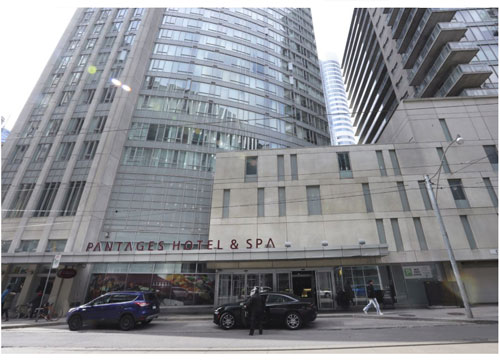Airbnb doesn’t play fair, say Toronto hotels
Toronto Star
By: Tess Kalinowski
09 March 2017

Toronto hotel
operators warn they are already at an unfair disadvantage from
short-term rentals, such as those offered through Airbnb.
Richard Lautens Toronto Star
When it comes to keeping a close eye on the competition, Toronto
hoteliers say they have little choice but to watch as the short-term
rental business scoops up lodgers right on their downtown doorsteps.
With Airbnb making its first forays into the full-service travel
industry and possibly prepping for a run at the long-term rental
market, hotel operators warn they are already at an unfair disadvantage
from short-term rentals.
The situation is particularly galling for the CEO of the Silver Group,
which owns the 92-room Pantages Hotel and Spa. Like a lot of newer
hotels, the Pantages shares space with residential condos. It also
shares its roof with some aggressive competitors.
Deepak Ruparell says there are about seven suites in the hotel tower
being used as short-term rentals in the prime tourist location near the
Eaton Centre and Yonge-Dundas Square.
There are another 35 or 40 short-term rentals in the Pantages' sister tower, operating as a de facto hotel, he said.
Ruparell is not impressed by Airbnb's recent claim that it brings $417
million into Toronto each year. If short-term rentals were taxed at the
commercial property rates his company pays, Ruparell figures the
revenue would go a long way to solving Toronto's budget challenges.
"They're paying $1,500 per residential unit in taxes whereas I'm paying $3,000 for commercial," he said.
Airbnb says it welcomes regulation and it wants its community to pay a fair share.
“Airbnb has agreements in more than 200 jurisdictions globally to
collect and remit hotel taxes on behalf of our hosts and guests. We are
committed to working with the City of Toronto on creating fair,
sensible rules for home sharing, including a fair and reasonable tax
solution," said Christopher Nulty, spokesperson for Airbnb in a
statement on Thursday.
"The majority of Airbnb hosts in Toronto, more than 80 per cent, only
share their primary residence, and do so three or four nights a month
to earn modest, supplemental income. We would like to see a system that
doesn’t pit our hosts unfairly against big, corporate hotels," he said.
Hoteliers are among the Airbnb critics who say they have no issue with
real home-sharing where someone rents out a room or they rent out their
home while they're on holiday themselves. But traditional hotels don't
want to be underminded by scenarios in which one owner or long-term
renter sub-lets multiple condos, often in the same building.
“What we've got is people buying condominiums and renting them out,
renting out apartments for 12 months a year and then re-subletting them
for two, three-night stays,” said Terry Mundell, president of the
Greater Toronto Hotel Association.
A report by a hotel workers union group called Fairbnb, says that 52
per cent of Airbnb revenue is generated by a disproportionately low 16
per cent of hosts.
It also quotes research by financial services firm Morgan Stanley that
shows 49 per cent of Airbnb users worldwide would have rented a
traditional hotel room if they weren't using the short-term rental
platform.
Airbnb says its Toronto business more than doubled last year to about
10,000 hosts. Canadian policy lead Alex Dagg told the Star this week
the average host earns about $5,000 a year.
The city estimates that hotels contribute $32 million annually in property taxes. They also pay HST.
Soon they will likely pay more because council's recently approved
budget includes a 4 per cent hotel tax. It also sanctions, in
principle, a 10 per cent tax on short-term rental revenue. Both those
taxes still need to be approved by the province. City staff estimated
that a tax of 10 per cent on short-term rentals would generate $6
million annually.
"The taxation issue is just one of equity," said Mundell. "(Short-term
rental landlords) want health care and education, I'm assuming, and all
the other services your tax dollars provide," he said.
In the same way they don't contribute to tax-funded services, they also
don't create hospitality industry jobs, nor are they subject to the
same health and fire regulations, say hotel operators.
It's not that the hotel industry isn't accustomed to technological
change and new competition, says Mundell, citing the introduction of
electronic booking sites that had some observers anticipating that
traditional hotel rates would plummet.
"We learned how to increase the value of our online presence, we
learned how to deal with customer loyalty programs. We came a long way
and we're continuing to evolve," he said.
"We're seeing some of the existing (hotel) product being redone into
boutique (hotels). Part of it is to compete against that Airbnb," said
Mundell.
At the Pantages, a flood in one short-term rental unit damaged 11
others including four hotel suites, said Ruparell, who is sympathetic
to the neighbouring condo residents.
"What happens in a condo board meeting (is) residents are really
(annoyed) because they have an uncontrolled environment — people living
next door to them, not knowing who they are.
“If it’s a hotel, at least we’re controlled, we know exactly who the
guests are, where they are, and we can react. We have a front desk, we
can send security up there, whatever," he said.
“But if it’s an Airbnb we have no control over them. In the case where
there was a big party in one room, there was a big flood, which flooded
11 units and then the insurance premium goes up.”
top contents
appendix
previous next
